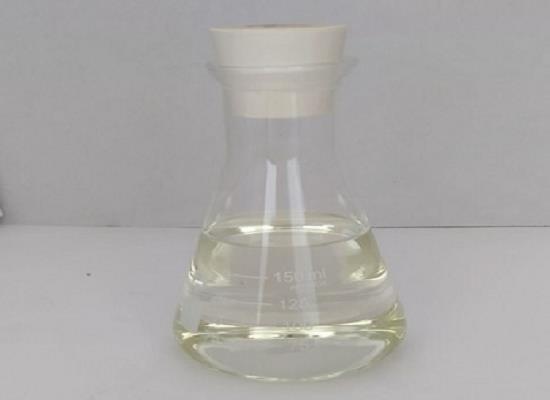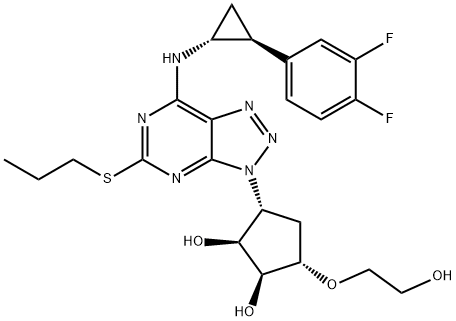Ticagrelor: mechanism of action, pharmacokinetics and application
Jul 10,2023
General Description
Ticagrelor is an orally active antiplatelet drug that acts by blocking P2Y12 receptors, thus preventing platelet aggregation mediated by ADP. It also inhibits the nucleotide-1 equilibrium transporter, leading to increased adenosine levels and further antiplatelet effects. Clinical trials have demonstrated its efficacy in reducing complications associated with atherosclerosis. Ticagrelor is rapidly absorbed after oral administration, with a bioavailability of approximately 36%. It is highly bound to plasma proteins and undergoes hepatic metabolism. The primary elimination route is through fecal excretion. Its plasma half-life is around 7 hours. Ticagrelor is indicated for the prevention and treatment of thromboembolism in adult patients with acute coronary syndrome, with a recommended dosing regimen of an initial loading dose followed by a maintenance dose twice per day. It should be used under healthcare professional guidance due to individual patient factors.

Figure 1. Tablets of ticagrelor
Mechanism of action
Ticagrelor is an orally active antiplatelet drug that exerts its mechanism of action by blocking ADP receptors of the subtype P2Y12. Unlike ADP, ticagrelor binds to a different site on the P2Y12 receptor and effectively prevents the transduction of signals initiated by ADP binding. This inhibition of platelet aggregation significantly reduces the occurrence of complications associated with atherosclerosis, such as myocardial infarction and stroke. Additionally, ticagrelor also inhibits the nucleotide-1 equilibrium transporter, leading to an increase in the local concentration of endogenous adenosine. The elevated levels of adenosine further contribute to the antiplatelet effects of ticagrelor. To ensure the safety profile of ticagrelor, three clinical trials were conducted. In summary, ticagrelor functions as an antiplatelet agent by blocking P2Y12 receptors and preventing ADP-mediated platelet activation. Its additional inhibition of the nucleotide-1 equilibrium transporter results in increased adenosine levels. Despite its efficacy in reducing atherosclerosis complications, caution should be exercised regarding the potential side effects associated with its use, especially when combined with other antiplatelet medications. 1
Pharmacokinetics
Ticagrelor exhibits rapid absorption from the gastrointestinal tract, leading to a quick onset of action. Its average oral bioavailability is approximately 36% due to significant hepatic first-pass metabolism. Both ticagrelor and its active metabolites have a high binding affinity to plasma proteins (>99.7%). Peak plasma concentration (Cmax) is reached around 1.5 hours for ticagrelor and 2.5 hours for its main metabolites. The primary elimination route for ticagrelor and its active metabolites is through hepatic metabolism. The majority of the drug and its metabolites are excreted in the feces, with only a small percentage (1%) recovered in the urine. The plasma half-life of ticagrelor is approximately 7 hours, while that of the active metabolite is about 8.5 hours. Ticagrelor is a substrate for the cytochrome P450 enzyme CYP3A4 and the transporter glycoprotein P (P-gp). It also exhibits weak inhibition of P-gp, which may potentially increase the exposure of other P-gp substrates when co-administered. It is important to note that individuals with a history of hyperuricaemia or uric acid nephropathy are advised to avoid taking ticagrelor. 2
Applications
Ticagrelor is indicated for the prevention and treatment of thromboembolism in adult patients with acute coronary syndrome (ACS). It is available as oral tablets in the United States and other countries. The recommended dose regimen for ticagrelor typically involves an initial loading dose of 180 mg, followed by a maintenance dose of 90 mg twice per day. This dosage regimen has been shown to be effective in reducing the risk of cardiovascular events in patients with ACS. It should be noted that the use of ticagrelor should be under the guidance and supervision of healthcare professionals, as individual patient factors and specific clinical circumstances may influence the dosing and duration of therapy. Overall, ticagrelor plays a crucial role in the management of thromboembolism associated with acute coronary syndrome, and its dosing regimen aims to provide optimal benefits while minimizing potential risks. 3
Reference
1. Roffman DS. Developments in Oral Antiplatelet Agents for the Treatment of Acute Coronary Syndromes: Clopidogrel, Prasugrel, and Ticagrelor. J Pharm Pract, 2016, 29(3):239-249.
2. Teng R. Pharmacokinetic, pharmacodynamic and pharmacogenetic profile of the oral antiplatelet agent ticagrelor. Clin Pharmacokinet, 2012, 51(5):305-318.
3. Wisher, D Martindale: the complete drug reference. 37th ed, J Med Libr Assoc, 2012, 100(1):75–76.
- Related articles
- Related Qustion
- Ticagrelor: Indications, Synthesis and Pharmacodynamics Feb 11, 2025
Ticagrelor, the first of a new class of antiplatelet agents, is a noncompetitive, direct-acting P2Y12-receptor antagonist.
- Ticagrelor-Acute myocardial infarction Sep 6, 2021
Ticagrelor is a new type of oral antiplatelet drug of cyclopentyltriazole pyrimidine. It was launched in Europe in December 2010. It has been approved for marketing in 85 countries including the United States.
Tributyl phosphate is versatile with applications in metal extraction, flame retardancy, and lubricant additives. It can be toxic; caution is necessary.....
Jul 10,2023APIDiquafosol Impurity-URD(Uridine) is one of the key nucleotide that making RNA. Uridine is a nucleotide base found in high levels in beer which is used for increasing synthesis of cellular membranes and for other neurological properties.....
Jul 10,2023Analytical ChemistryTICAGRELOR
274693-27-5You may like
- Ticagrelor
-

- $0.00 / 1Kg/Bag
- 2025-04-24
- CAS:274693-27-5
- Min. Order: 1KG
- Purity: 98%-102%
- Supply Ability: 100kgs
- TICAGRELOR
-

- $0.00 / 1kg
- 2025-04-24
- CAS:274693-27-5
- Min. Order: 1kg
- Purity: 99%
- Supply Ability: 1000kg
- Ticagrelor
-

- $0.00 / 25Kg/Bag
- 2025-04-23
- CAS:274693-27-5
- Min. Order: 2Kg/Bag
- Purity: 99% up, High Density
- Supply Ability: 20 tons






